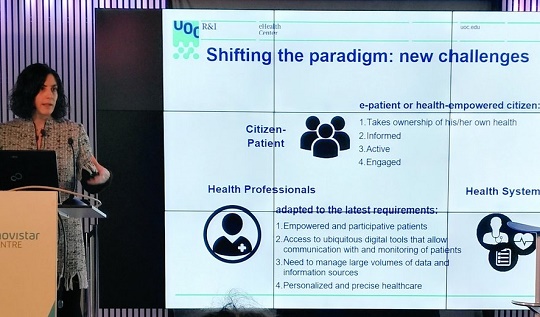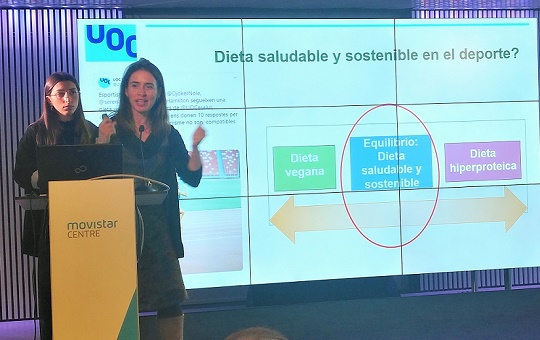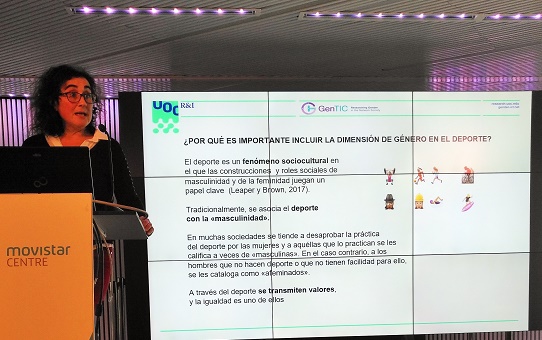The 2019 Workshop Analytics@Sports&Health was held on 11-12 November 2019 at Movistar Centre, in Barcelona, and gathered a heterogeneous range of talks on the current and future applications of data science and artificial intelligence to health and sports. The event was co-organized by Research Groups ICSO and Gender and ICT of the Internet Interdisciplinary Institute (IN3-UOC), together with FoodLab (UOC Faculty of Health Sciences), within the framework of the Spanish Network on Data Analytics and New Technologies in Sport and Health (05/UPR/19), funded by the Spanish Ministry of Culture and Sport. The event was sponsored by Movistar Centre.
Outstanding scholars and experts in the fields of health and sports addressed how big data analysis and artificial intelligence can help to improve the decision-making process and strategic planning in both settings, enhance disease treatment and prevention, and ultimately increase the quality of life of all citizens.
David Megías (director of the Internet Interdisciplinary Institute, IN3), and Albert Barberà (director of UOC eHealth Centre) opened the workshop. David Megías mentioned about both the opportunities and challenges associated with the design of technologies for health and sport, including those associated with the presence of gender biases. Albert Barberà highlighted the need to train and empower both health professionals and patients in the management and understanding of information gathered with new technologies in order to promote a society oriented to disease prevention. Digitalization and eHealth apps might help to address some of the current challenges of the health system in order to provide more personalized and accurate healthcare or to get better persuasive elements that facilitate treatment.

Noemí Robles, member of UOC eHealth Centre, introduced the tools and methodologies that the UOC eHealth Centre provides in the design and assessment of eHealth interventions, with a specific focus on education, health-related data science and equity as main transversal areas.
The essential interrelationship between sports and health was underlined by several speakers, such as Ramon Gomis (Dean of UOC Faculty of Health Sciences) and Montser Bellver, physician specialised in sports medicine at the High Performance Center (CAR) in Sant Gugat, who remarked the importance of transferring available knowledge resulting from sports research to clinical practice and health advice.
Diverse communications offered nowadays examples on how data science is being applied to the sports and health sectors: David López, director of Fhios Smart Knowledge, explained how artificial intelligence algorithms and predictive models are used to attract and develop talent in sport; Elena Milla, physician specialized in ophthalmology at Hospital Clinic, focused her talk on how the use of techniques of machine learning and deep learning can improve the quality of cataract and glaucoma treatment and prevention; Fermín Mallor (Universidad Pública de Navarra) introduced initiatives of data analysis and simulation models generation that enhance operations management and decision-making in hospital emergency services, whereas Antoni Llop, director at Eurofitness, highlighted how wearables and internet of things can be applied to personalize sports training and improve users’ experiences in fitness centres.

Anna Bach (UOC Faculty of Health Sciences) and Natalia Panadero (BA in Nursing and MSc in Health and Nutrition) addressed how data analysis and machine learning contribute to a healthier and more sustainable diet. Their research activity at the UOC FoodLab research group aims at developing indicators to measure the environmental and health impact of dietary patterns.
Milagros Sáinz (director of GenTIC) and her thesis student Sara Rozenwajn (PhD candidate at Universidad de La Laguna) remarked the existence of gender inequalities in sports and Physical Education. Milagros Sáinz pointed up how sports have been traditionally associated with masculinity and the persistence of important gender biases and stereotypes regarding women’s and men’s capabilities and expectations related to sports and other related leisure activities. Sara Rozenwajn underlined the existence of gender gaps in sports datasets and the challenges that sports teachers and the sports industry face to promote gender equality values in a digital society.
Lucía Artazcoz, director of Health Promotion at the Public Health Agency of Barcelona, focused on gender inequalities and health. In her talk, Lucía Artazcoz showed evidence on how gender socialization and the sexual division of labour, together with other structural determinants of health inequities and social hierarchies, have an impact on people’s living conditions and health.
Other talks addressed topics such as the use of data science and gamification to promote occupational health (Estel Mallorquí and Oriol Aragay from Biwel); professional sports data management to improve healthcare (Toni Caparrós from INEFC); the characteristics of the Catalan sports ecosystem (Gerard Esteva from the Union of Sports Federations of Catalonia); the use of sports data analysis that insurance companies make in the assessment of risks (Daniel Espiga from Divina Pastora Seguros), or the future applications of big data and artificial intelligence and related concerns regarding cybersecurity and privacy risks (Marc Cortés from Leitat).
Finally, Camille Evard (UOC R&I Funding Unit) and Sara Hatami (UOC Knowledge Transfer & Entrepreneurship Unit) offered an overview of local and international funding opportunities for research, innovation and transfer initiatives in the fields of sports and health.
The event ended with concluding remarks by Ángel A. Juan (Principal Investigator of ICSO research group at the IN3-UOC), Anna Bach (UOC Faculty at the Department of Health Sciences) and María José Romano (GenTIC) on the future steps of the Spanish Network on Data Analytics and New Technologies applied to Sports and Health. Some future challenges should be addressed in an interdisciplinary way: how to ensure the quality of data and its correct interpretation; the integration of ethical concerns regarding ownership of the data, accessibility and privacy; or encouraging an inclusive design and development of new technologies and artificial intelligence that preserve human rights with a high social impact.
